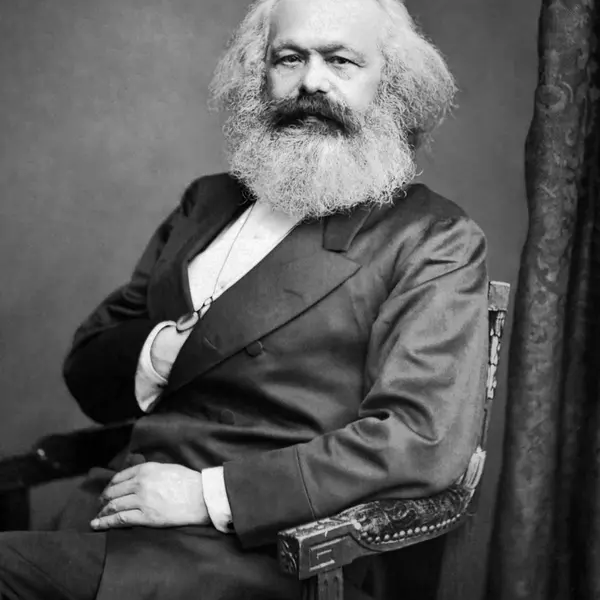
5 Things Karl Marx Got Right
29 September 2025
Capitalism was only growing in Karl Marx’s day, yet he identified some of the key problems with this economic system. Some of the problems he pointed out we are still experiencing today.
Capitalism gives workers some crumbs from the masters’ tables; it exploits our labour. We get a wage that’s worth a fraction of the wealth we produce for the bosses. I truly believe I was not born to eat crumbs and to be exploited for someone else’s profit. Karl Marx is challenging you to be a critical thinker when looking at capitalism, and when you see the flaws of the system you must find a way to change it.
ONE: Modern work is alienated
Karl Marx knew that creative work could be a source of joy and give us sense of community, he understood that work was a nature imposed necessity - we have to apply our labour to nature to make the necessities of life. Under capitalist the boss controls the work process and workers get to make no input.
In most jobs we workers have to work robotically and do one meaningless partial task which goes towards creating the product or service as a whole. Marx believed that this lack of control over work leads to alienation, a feeling of disconnect between what you do all day, who you feel you truly are, and how you much control you feel over your social environment.
We can agree that this is true for workers today. The vast majority of us have to do robotic jobs where we work just to earn money to pay bills or struggle to raise a family. We are not doing these jobs because we love meaningless work - rather we do them out of the need for earning to survive in this capitalist system.
Even white collar jobs for tech giants are strictly controlled by a whole hierachy of HR managers and job targets. We don’t get opportunities in a capitalist society to do work that really allows us to externalise our creativity. We are just cogs in a profit making machine.
A planned economy would allow workers to make decisions about what we produce and how we produce it. Increased productivity under capitalism leads to alienation and stress but increased productivity under socialism would mean more free time to develop as human beings.
TWO: Modern work makes us insecure
Marx believed that capitalism makes workers expendable. Workers could be let go the minute any changes happened that impacted the bosses’ costs of production. Marx knew that people deep down did not want to be arbitrarily let go.
This is very true today, worker jobs are more precarious. Workers are replaceable in jobs that require fewer skills, and the financial fear of losing your jobs make us feel more insecure than ever. Very few jobs today exist for life. With the cost of living in a capitalist society rising, our financial needs are growing so we can exist. We now feel more insecure than ever.
It’s built into the system to throw workers out and replace them with machines. And workers, who generally specialise in a particular skill, then struggle to find alternative work. We saw this with the collapse of construction after the 2008 banking crash.
THREE: Workers get paid little while capitalists get rich
Karl Marx believed that capitalist bosses shrink the wages of labourers as much as possible to skim a profit off the top. The goods and services you make every day in work far outweigh the wage you get. Profit is unpaid labour, stolen labour.
Even well paid workers might think they’re exempt from this process but their wages can still shrink relative to the goods and services they create.
In the capitalist system of today, many workers cannot afford the produce they make - for example, the latest Apple iphone, an electric car, many families have to cut back even on the food we need. Building workers spend a lifetime building homes they can no longer afford.
Capitalism is sentencing human labourers into a near prison life of work, caged and guarded like an animal, with nothing to show for our hard work, but sorrow in their eyes. Is this what we want in modern society? The wealth we create by working day in, day out moves upwards.
FOUR: Capitalism is unstable
For Karl Marx, crisis is endemic to capitalism, but unlike systems of the past were people starved because there was too little now we face an overabundance of produce, they dump food while people starve to death.
Capitalism is an unplanned system. That means no one knows in advance what people really need. There are crises of “overproduction” - too many commodities are produced than can be profitably sold. We see this in the overproduction of food, and commodities like butter, wine, and wheat mountains.
We can produce and provide for everything we need, and less people would have to work and we could have more leisure and freedom to do other things we creatively enjoy. Under the capitalist system we see more “bullshit jobs” producing for the sake of it rather than the need for it.
How many people are working on advertising for social media platforms, selling junk, and would rather be doing something else with their creative skills?
In 2008 we witnessed capitalism imploding when the financial crisis hit. This crisis should have ended capitalism, but it was saved from sinking by government intervention, a price us workers had to pay. Ironic that we were forced to feed the beast that was killing us, somehow we were all made feel bad for spending.
But that was what the capitalist system wanted you to feel, we got punished for enjoying life and the capitalist system gets saved - just to run riot another day.
FIVE: It will take a revolution to escape
Karl Marx was witness to the revolutions of 1848 and wrote on the Paris Commune of 1871. He argued that capitalism was inherently flawed and needed to be overthrown. Only a people power uprising of the working class could break the state that defends the rich and replace it with democratic assemblies of workers.
He also argued that revolution was necessary because the struggle brought people together and forged a new working class, with a socialist and communal character. The revolution was a way to overcome alienation, take power into working class hands and start running our own lives.
In today’s modern society Karl Marx is less and less mentioned and often just dismissed, but we should not reject Marx’s criticism of capitalism so quickly, but rather look at what he got right, and use his theory as a guide to help us steer a better future where capitalism will have been overthrown.
As we know, everything has a start, middle and end so does capitalism. Karl Marx theories were developed as the system was being born. 21st Century capitalism is for me in its dying stages. But the state will always intervene to make us suffer everytime there’s a crisis. The system won’t die a natural death, we need to push it over.
People’s lives improved under the capitalist system since Marx’s time, but our poverty relative to the billionaire bosses is greater than ever before. And the system only grew during periods like the post-war boom on the basis of the war that preceeded it. Millions died as corporate competition spilled over into military conflict.
When people realise they still cannot afford to live on the wages they have, we will see more workers striking, A.I. and robotics taking away jobs.
So what will we replace capitalism with? Is it time for a planned economy, for socialism. Can we all be convinced in that there is only one way to eliminate the capitalist system, by establishing a worker-run socialist economy, a system which would focus on social goals and the future of our planet.
Marx wasn’t just a thinker, he was a fighter. His words echo down through time, they are very clear: “The philosophers have only interpreted the world in various ways, the point however is to change it". Do we have what it takes to change it?
 RED NETWORK
RED NETWORK